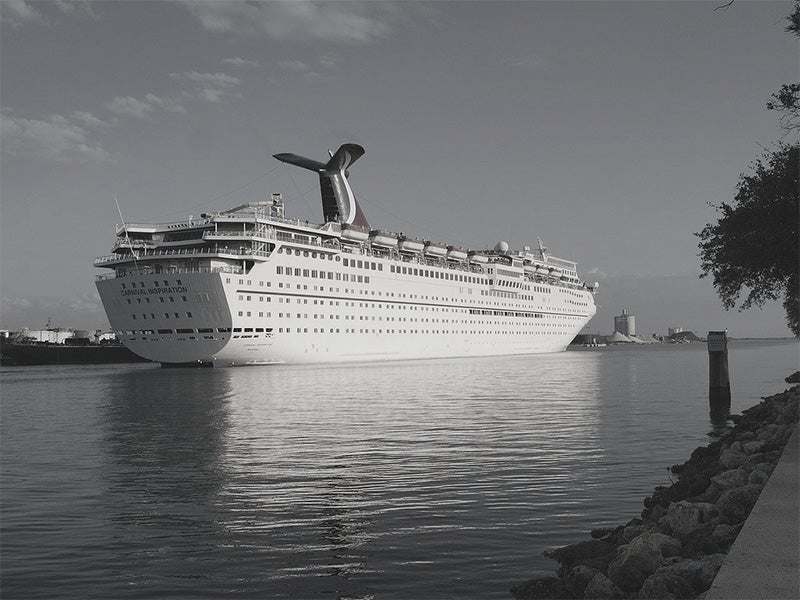EPA Delays Action as Ship Sewage Flows into U.S. Waters
Environmental group seeks court-ordered deadline for sewage treatment improvements
Contact
Today, Friends of the Earth, represented by Earthjustice, filed a lawsuit in federal court seeking more effective regulation of sewage discharges from cruise ships and other vessels in U.S. waters. Cruise ships alone dumped more than 1 billion gallons of sewage in the ocean last year, much of it poorly treated. In addition, tens of thousands of ocean-going vessels like cargo ships and oil tankers discharged even more inadequately treated sewage into our coastal waters.
The number and size of ships in U.S. waters continues to rapidly expand while federal standards governing their sewage discharges remain more than 35 years out of date. Cruise ships with populations the size of small towns ply the waters off our coasts and massive cargo ships carrying goods to our ports produce and then dump large amounts of partially treated sewage and other wastes into our oceans. This waste pollutes our beaches, contaminates our coral reefs, and destroys our valuable marine ecology. Sewage contamination also puts swimmers at elevated risk of illness and can make seafood caught by coastal fishermen unsafe to eat. Additionally, discharges from ships disrupt coastal economies. In 2012, ship sewage contributed to elevated levels of fecal coliform that led to more than 31,000 days of beach advisories and closings.
Marcie Keever, Oceans and vessels program director at Friends of the Earth, said “Sewage-contaminated waters not only harm sea life, but also harm people who use these waters. These ship sewage discharges contribute to the risk of serious, potentially life-threatening health effects such as gastrointestinal illnesses, hepatitis, ear nose and throat illnesses, vomiting, and respiratory diseases. The EPA reported in 2000 that its ship sewage treatment standards were out of date and needed an update. After 38 years, it is time for EPA to act.”
U.S. environmental laws have not kept pace with growth of the industry. In certain regions, including New England and California, ship sewage discharges close to shore have been banned. However, the Northwest, the Gulf of Mexico and almost the entire Southeast remain unprotected from ship sewage. New laws and standards are urgently needed to protect all of our ocean waters.
Friends of the Earth has a history of urging the EPA to act on this issue. In April 2009, Friends of the Earth petitioned the EPA to update its 1976 performance standards and pollution limits for onboard marine sanitation devices (the systems that are supposed to treat sewage on ships) to reflect dramatic, cost-effective improvements in sewage treatment technologies, and to establish new monitoring, recordkeeping, and reporting requirements to ensure compliance. Five years later, the EPA has yet to issue a substantive response or propose any changes to the standards.
“The EPA is required under the Clean Water Act to protect people who swim, boat, and fish in waters affected by ship sewage discharges,” said Andrea Treece of Earthjustice, who filed the lawsuit for Friends of the Earth. “Modern sewage treatment options are available for relatively low cost, but EPA hasn’t updated it regulations to reflect those advances since 1976. As a result, ships can dump bacteria-laden wastewater in some of our most valuable waters.”
Sewage releases near shellfish beds can be particularly dangerous to public health. When eaten raw or undercooked, contaminated shellfish can pose considerable health risks to humans who consume them. Coral reefs are also vulnerable to harm by sewage discharges from marine vessels. Pathogens from sewage can cause disease and scarring in many coral species. Nutrients from sewage, like nitrogen and phosphorus, promote excessive algal growth, which consumes oxygen in the water and can smother reefs and the marine ecosystems they support.
It is important to note that cruise lines in particular are not equal offenders when it comes to sewage treatment and dumping. The 2013 Friends of the Earth Cruise Ship Report Card found Disney, Norwegian, Royal Caribbean, Celebrity, Cunard, and Seabourn Cruise Line have all installed advanced sewage treatment systems in a majority of their ships, while Carnival, Silversea, Costa, and Crystal Cruises all received failing grades.

Additional Resources
About Earthjustice
Earthjustice is the premier nonprofit environmental law organization. We wield the power of law and the strength of partnership to protect people's health, to preserve magnificent places and wildlife, to advance clean energy, and to combat climate change. We are here because the earth needs a good lawyer.